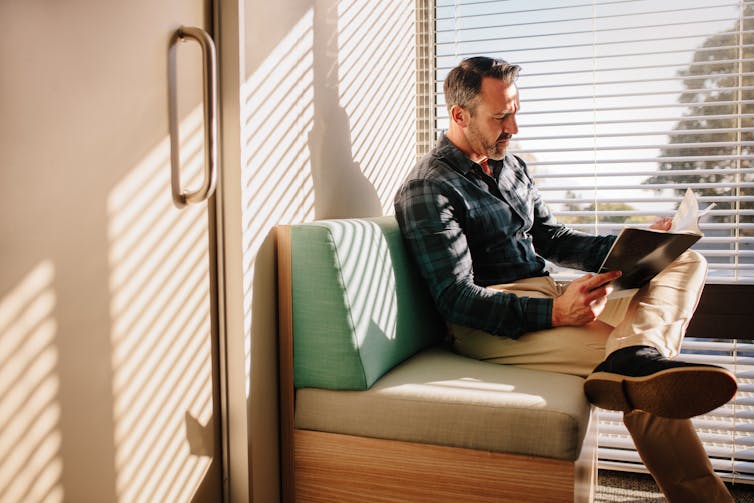the GP's role in mental health care
- Written by Louise Stone, General practitioner; Clinical Associate Professor, ANU Medical School, Australian National University
Around 70% of people who sought treatment for their mental health in Australia in 2015-16 saw a general practitioner. This amounts to 18 million dedicated mental health consultations.
GPs are often the first point of contact for people concerned about their mental health. Mostly, though, mental health care occurs within consultations initiated for other reasons. This could be when someone sees a doctor for a physical health concern, a general check up, or to get a prescription.
Whatever the reason, GPs see 88% of the Australian population every year, putting us in a unique position in the health system to work with people with mental health concerns.
When you visit your GP with a mental health concern, you should be able to expect compassionate care alongside practical advice to help you navigate the treatment you need.
Read more: Depression: it’s a word we use a lot, but what exactly is it?
Why see a GP for your mental health needs?
People can see us without a referral, and we get to know our patients over time, which can make it easier to discuss difficult issues.
We see patients during important transitions, for example after giving birth, after a major illness, or during a relationship crisis.
We also see people at higher risk of mental illness than the overall population, such as refugees, Aboriginal and Torres Strait Islander Australians, LGBTI people, and those experiencing poverty and homelessness. Many of our patients are survivors of childhood abuse, domestic violence, or other forms of trauma.
 If you have a mental illness, you may need treatment beyond what a GP can provide. But a GP can help you understand your options.
From shutterstock.com
If you have a mental illness, you may need treatment beyond what a GP can provide. But a GP can help you understand your options.
From shutterstock.com
We understand certain physical illnesses and medications can predispose people to mental illness. We also understand people with serious mental illnesses are likely to die from physical diseases up to 20 years earlier than the general population. So we can focus on physical and mental health together.
We are trained in diagnosis, but we understand mental health is complex. Not everyone with depression has the same illness experience. It’s critical we help people understand what their illness means, not just what it “is”.
It’s then our responsibility to help our patients understand their options, by communicating the evidence behind different treatments, and helping them navigate the mosaic of services available.
Read more: Stroke, cancer and other chronic diseases more likely for those with poor mental health
Finding the right clinic and the right doctor
The billings we generate in the consulting room fund our clinics and our staff. The longer the consultation, the lower the patient’s Medicare subsidy per minute. In other words, shorter consultations earn much more money for the clinic.
Some bulk-billing clinics use this incentive to drive what’s become known as “six-minute medicine”: where the majority of consultations are very quick and therefore lucrative. These business models don’t enable complex care, like the sort of care needed to deal with a mental health issue, to occur easily.
Further, individual GPs have certain areas of practice that interest them. Some GPs are more interested in and comfortable with physical health than mental health care.
Consumers have reported disappointing encounters with some GPs, describing, for example, poor communication skills and a perceived lack of competence in mental health care.
It’s important to take the time to find a clinic and a GP right for you.
Navigating a fraught system
The mental health sector is complex and fragmented with overlaps, inefficiencies, duplication and poor coordination of services. GPs spend a significant amount of time assisting patients to navigate multiple mental health systems (state services, Commonwealth services, non-government services, and private services).
We often have few accessible resources at our disposal to help our patients recover. Psychologists and other allied health practitioners are frequently unaffordable or inaccessible. There’s a shortage of psychiatrists in Australia. Acute psychiatric beds, particularly for young people or patients with eating disorders, are in short supply.
Read more: To really fix Victoria's mental health system, we'll need to bridge the state/Commonwealth divide
Meanwhile, disadvantaged communities have higher rates of mental illness, but lower access to services.
Unfortunately, none of these problems will be solved within a GP’s consulting room – but we do our best to navigate them case by case.
 Understanding the mosaic of services available for mental health can be challenging.
From shutterstock.com
Understanding the mosaic of services available for mental health can be challenging.
From shutterstock.com
10 tips for patients
We believe the core of mental health care is a consistent, empathic therapeutic relationship to support consumers in their journey towards recovery.
Every consumer has the right to find a GP who can partner in that recovery. These tips will help you get the most out of your GP mental health consultation:
- if you can, make a longer appointment. Mental health consultations take time
- choose a GP carefully. You need to feel comfortable with them
- consider taking a supportive friend or relative with you
- if waiting rooms are stressful for you, consider timing your appointment at the beginning or end of the day
- have a list of medications and therapies you’ve tried, and whether you found them helpful
- if you have any reports from previous doctors, bring them with you
- your GP will want to know your family history, including physical and mental health disorders, so find out what you can
- be as honest and open as you can. Your GP can help you more effectively if they know what’s going on. This includes drug and alcohol issues which commonly accompany mental illness
- if you need an interpreter, let the practice know in advance
- be patient. It may take a few consultations for your GP to really understand what you need.
Read more: When it's easier to get meds than therapy: how poverty makes it hard to escape mental illness
Authors: Louise Stone, General practitioner; Clinical Associate Professor, ANU Medical School, Australian National University



















